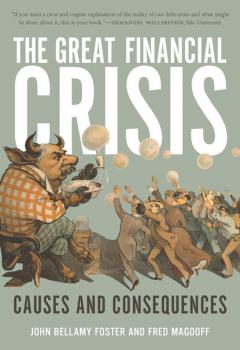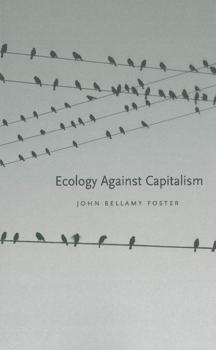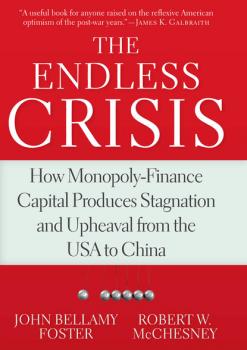ТОП просматриваемых книг сайта:















John Bellamy Foster
Список книг автора John Bellamy FosterАннотация
Remember that metaphor about the frog that slowly cooks to death in the pot of increasingly warm water? Leftists have used it for years to describe how people can accept dwindling health care, fading job opportunities, eroding racial and gender equality—as long as the loss occurs gradually. Now, with Donald Trump having slouched off to Washington, most of the mainstream media are working overtime to convince us that we can still stand the heat. Leave it to John Bellamy Foster, one of the world’s outstanding radical scholars, to expose Trump for who and what he is: a neo-fascist. Just at the boiling point, Foster offers us cool logic to comprehend the system that created Trump’s moral and political emergency—and to resist it.In Trump in the White House, John Bellamy Foster does what no other Trump analyst has done before: he places the president and his administration in full historical context. Foster reveals that Trump is merely the endpoint of a stagnating economic system whose liberal democratic sheen has begun to wear thin. Beneath a veneer of democracy, we see the authoritarian rule that oversees decreasing wages, anti-science and climate-change denialism, a dying public education system, and expanding prisons and military—all powered by a phony populism seething with centuries of racism that never went away.But Foster refuses to end his book in despair. Inside his analysis is a clarion call to fight back. Protests, popular demands, coalitions: everyone is needed. Change can’t happen without radical, anti-capitalist politics, and Foster demonstrates that—even now, with the waters ever warming—it may yet be possible to stop the desecration of the Earth; to end endless war; to create global solidarity with all oppressed people. Could a frog do that?
Аннотация
From reviews of the first edition (1994): "Extraordinarily well written . . . " –Contemporary Sociology "A readable chronicle aimed at a general audience . . . Graceful and accessible . . . " –Dollars and Sense «Has the potential to be a political bombshell in radical circles around the world.» –Environmental Action The Vulnerable Planet has won respect as the best single-volume introduction to the global economic crisis. With impressive historical and economic detail, ranging from the Industrial Revolution to modern imperialism, The Vulnerable Planet explores the reasons why a global economic system geared toward private profit has spelled vulnerability for the earth's fragile natural environment. Rejecting both individualistic solutions and policies that tinker at the margins, John Bellamy Foster calls for a fundamental reorganization of production on a social basis so as to make possible a sustainable and ecological economy. This revised edition includes a new afterword by the author.
Аннотация
In the fall of 2008, the United States was plunged into a financial crisis more severe than any since the Great Depression. As banks collapsed and the state scrambled to organize one of the largest transfers of wealth in history, many—including economists and financial experts—were shocked by the speed at which events unfolded.In this new book, John Bellamy Foster and Fred Magdoff offer a bold analysis of the financial meltdown, how it developed, and the implications for the future. They examine the specifics of the housing bubble and the credit crunch as well as situate current events within a broader crisis of monopoly-finance capitalism—one that has been gestating for several decades. It is the «real» productive economy’s tendency toward stagnation, they argue, that creates a need for capital to find ways to profitably invest its surplus. But rather than invest in socially useful projects that would benefit the vast majority, capital has constructed a financialized «casino» economy that neglects social needs and, as has become increasingly clear, is fatally unstable. Written over a two-year period immediately prior to the onset of the crisis, this timely and illuminating book is necessary reading for all those who wish to understand the current situation, how we got here, and where we are heading.
Аннотация
Praise for Foster and Magdoff’s The Great Financial Crisis: In this timely and thorough analysis of the current financial crisis, Foster and Magdoff explore its roots and the radical changes that might be undertaken in response. . . . This book makes a valuable contribution to the ongoing examination of our current debt crisis, one that deserves our full attention.—Publishers WeeklyThere is a growing consensus that the planet is heading toward environmental catastrophe: climate change, ocean acidification, ozone depletion, global freshwater use, loss of biodiversity, and chemical pollution all threaten our future unless we act. What is less clear is how humanity should respond. The contemporary environmental movement is the site of many competing plans and prescriptions, and composed of a diverse set of actors, from militant activists to corporate chief executives.This short, readable book is a sharply argued manifesto for those environmentalists who reject schemes of “green capitalism” or piecemeal reform. Environmental and economic scholars Magdoff and Foster contend that the struggle to reverse ecological degradation requires a firm grasp of economic reality. Going further, they argue that efforts to reform capitalism along environmental lines or rely solely on new technology to avert catastrophe misses the point. The main cause of the looming environmental disaster is the driving logic of the system itself, and those in power—no matter how “green”—are incapable of making the changes that are necessary.What Every Environmentalist Needs To Know about Capitalism tackles the two largest issues of our time, the ecological crisis and the faltering capitalist economy, in a way that is thorough, accessible, and sure to provoke debate in the environmental movement.
Аннотация
In recent years John Bellamy Foster has emerged as a leading theorist of the Marxist perspective on ecology. His seminal book Marx's Ecology (Monthly Review Press, 2000) discusses the place of ecological issues within the intellectual history of Marxism and on the philosophical foundations of a Marxist ecology, and has become a major point of reference in ecological debates. This historical and philosophical focus is now supplemented by more directly political engagement in his new book, Ecology against Capitalism. In a broad-ranging treatment of contemporary ecological politics, Foster deals with such issues as pollution, sustainable development, technological responses to environmental crisis, population growth, soil fertility, the preservation of ancient forests, and the «new economy» of the Internet age. Foster's introduction sets out the unifying themes of these essays enabling the reader to draw from them a consolidated approach to a rapidly-expanding field of debate which is of critical importance in our times. Within these debates on the politics of ecology, Foster's work develops an important and distinctive perspective. Where many of these debates assume a basic divergence of «red» and «green» issues, and are concerned with the exact terms of a trade-off between them, Foster argues that Marxismproperly understoodalready provides the framework within which ecological questions are best approached. This perspective is advanced here in accessible and concrete form, taking account of the major positions in contemporary ecological debate.
Аннотация
In 1966, Paul Baran and Paul Sweezy published Monopoly Capital,a monumental work of economic theory and social criticismthat sought to reveal the basic nature of the capitalism of theirtime. Their theory, and its continuing elaboration by Sweezy, HarryMagdoff, and others in Monthly Review magazine, infl uenced generationsof radical and heterodox economists. They recognizedthat Marx’s work was unfi nished and itself historically conditioned,and that any attempt to understand capitalism as an evolvingphenomenon needed to take changing conditions into account.Having observed the rise of giant monopolistic (or oligopolistic)fi rms in the twentieth century, they put monopoly capital at thecenter of their analysis, arguing that the rising surplus such fi rmsaccumulated—as a result of their pricing power, massive salesefforts, and other factors—could not be profi tably invested backinto the economy. Absent any “epoch making innovations” like theautomobile or vast new increases in military spending, the resultwas a general trend toward economic stagnation—a condition thatpersists, and is increasingly apparent, to this day. Their analysiswas also extended to issues of imperialism, or “accumulation ona world scale,” overlapping with the path-breaking work of SamirAmin in particular. John Bellamy Foster is a leading exponent of this theoretical perspectivetoday, continuing in the tradition of Baran and Sweezy’sMonopoly Capital. This new edition of his essential work, TheTheory of Monopoly Capitalism, is a clear and accessible explicationof this outlook, brought up to the present, and incorporatingan analysis of recently discovered “lost” chapters from MonopolyCapital and correspondence between Baran and Sweezy. It alsodiscusses Magdoff and Sweezy’s analysis of the fi nancializationof the economy in the 1970s, ‘80s, and ‘90s, leading up to theGreat Financial Crisis of the opening decade of this century. Fosterpresents and develops the main arguments of monopoly capitaltheory, examining its key exponents, and addressing its critics in away that is thoughtful but rigorous, suspicious of dogma but adamantthat the deep-seated problems of today’s monopoly-fi nancecapitalism can only truly be solved in the process of overcomingthe system itself.
Аннотация
The days of boom and bubble are over, and the time has come to understand the long-term economic reality. Although the Great Recession officially ended in June 2009, hopes for a new phase of rapid economic expansion were quickly dashed. Instead, growth has been slow, unemployment has remained high, wages and benefits have seen little improvement, poverty has increased, and the trend toward more inequality of incomes and wealth has continued. It appears that the Great Recession has given way to a period of long-term anemic growth, which Foster and McChesney aptly term the Great Stagnation. This incisive and timely book traces the origins of economic stagnation and explains what it means for a clear understanding of our current situation. The authors point out that increasing monopolization of the economy—when a handful of large firms dominate one or several industries—leads to an over-abundance of capital and too few profitable investment opportunities, with economic stagnation as the result. Absent powerful stimuli to investment, such as historic innovations like the automobile or major government spending, modern capitalist economies have become increasingly dependent on the financial sector to realize profits. And while financialization may have provided a temporary respite from stagnation, it is a solution that cannot last indefinitely, as instability in financial markets over the last half-decade has made clear.
Аннотация
Progress requires the conquest of nature. Or does it? This startling new account overturns conventional interpretations of Marx and in the process outlines a more rational approach to the current environmental crisis. Marx, it is often assumed, cared only about industrial growth and the development of economic forces. John Bellamy Foster examines Marx's neglected writings on capitalist agriculture and soil ecology, philosophical naturalism, and evolutionary theory. He shows that Marx, known as a powerful critic of capitalist society, was also deeply concerned with the changing human relationship to nature. Marx's Ecology covers many other thinkers, including Epicurus, Charles Darwin, Thomas Malthus, Ludwig Feuerbach, P. J. Proudhon, and William Paley. By reconstructing a materialist conception of nature and society, Marx's Ecology challenges the spiritualism prevalent in the modern Green movement, pointing toward a method that offers more lasting and sustainable solutions to the ecological crisis.








